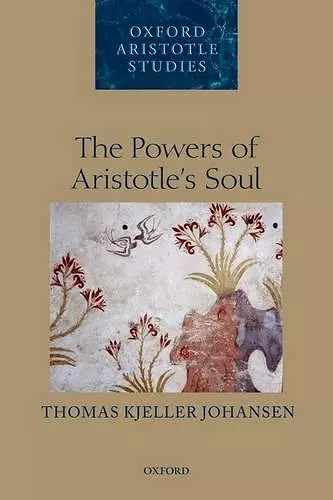The Powers of Aristotle's Soul
Thomas Kjeller Johansen author
Format:Paperback
Publisher:Oxford University Press
Published:25th Jun '15
Currently unavailable, and unfortunately no date known when it will be back
This paperback is available in another edition too:
- Hardback£105.00(9780199658435)

Aristotle is considered by many to be the founder of 'faculty psychology'--the attempt to explain a variety of psychological phenomena by reference to a few inborn capacities. In The Powers of Aristotle's Soul, Thomas Kjeller Johansen investigates his main work on psychology, the De Anima, from this perspective. He shows how Aristotle conceives of the soul's capacities and how he uses them to account for the souls of living beings. Johansen offers an original account of how Aristotle defines the capacities in relation to their activities and proper objects, and considers the relationship of the body to the definition of the soul's capacities. Against the background of Aristotle's theory of science, Johansen argues that the capacities of the soul serve as causal principles in the explanation of the various life forms. He develops detailed readings of Aristotle's treatment of nutrition, perception, and intellect, which show the soul's various roles as formal, final and efficient causes, and argues that the so-called 'agent' intellect falls outside the scope of Aristotle's natural scientific approach to the soul. Other psychological activities, various kinds of perception (including 'perceiving that we perceive'), memory, imagination, are accounted for in their explanatory dependency on the basic capacities. The ability to move spatially is similarly explained as derivative from the perceptual or intellectual capacities. Johansen claims that these capacities together with the nutritive may be understood as 'parts' of the soul, as they are basic to the definition and explanation of the various kinds of soul. Finally, he considers how the account of the capacities in the De Anima is adopted and adapted in Aristotle's biological and minor psychological works.
[T]his fine and important book ... should be required reading for anyone with an interest in Aristotleâs psychology and theory of nature. It is sure to serve as a touchstone in debates about the issues it treats for many years to come. * Mark A. Johnstone, Mind *
Review from previous edition The Powers of Aristotle's Soul is certain to be a valuable contribution to the existing literature on Aristotle's De Anima. Its novelty lies in its overall approach to De Anima, as it seeks to situate the work within Aristotle's natural philosophy while offering an interpretation of the relationship between the various capacities of Aristotle's soul. While the work functions splendidly as a whole, a number of its individual chapters are able to stand alone as valuable discussions of the particular capacities central to De Anima. The work will be most valuable to scholars and advanced students of Aristotle with an interest in Aristotle's scientific methodology and psychology; it will also be useful for historians and contemporary philosophers with an interest in the history of faculty psychology and the Aristotelian accounts of perception and nutrition. * Journal of the History of Philosophy *
Johansen proves, once again, that he is at the cutting edge of scholarship on Aristotle, not falling into any particular camp of interpretation but forging a new way into studying the ancients. * Tijdschrift voor Filosofie *
. . .a significant contribution to our understanding of capacities and the soul in Aristotle and to our overall understanding of the De Anima. [Johansen's] interpretations are always carefully developed and show an excellent grasp of Aristotle's entire corpus . . . I would recommend this work for all scholars working on Aristotle or on ancient understandings of powers or the soul. It may also prove of interest for those in contemporary philosophy who are working on the notion of powers. * Notre Dame Philosophical Reviews *
ISBN: 9780198728993
Dimensions: 233mm x 157mm x 18mm
Weight: 442g
312 pages